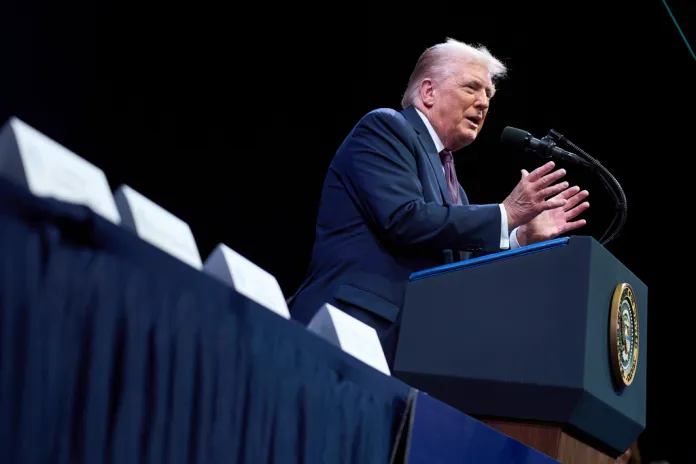President Donald Trump and his MAGA agenda are not shy when it comes to bending conservative norms. In his second term, states’ rights, once a rallying cry for conservatives, are under pressure. Trump has strong-armed private companies and universities, and is testing the approach to free speech, while showing flexible foreign policy when it comes to adversaries like China. This Washington Examiner series, Upend the Orthodoxy, will take an in-depth look at all of these.
President Donald Trump is pushing the envelope on the relationship between government and free markets, reshaping the way that Republicans have historically embraced capitalistic ideals.
Trump’s attempts to strongarm private companies such as tech giants, a string of law firms, and media companies, as well as pressuring higher education institutions, have created an unorthodox playbook that misaligns with conservatives’ traditional fears of government overreach.
It’s left supporters on Capitol Hill delighted, frustrated, or wondering what’s next.
“Generally, it tends to go against the grain of just the way I think about private enterprise and the relationship of government with private enterprise. But I don’t want to just reject it out of hand,” Sen. Cynthia Lummis (R-WY) said. “I just need to learn more about it. It raises eyebrows, right?”
In his second term, Trump has continued pushing the boundaries of his powers and influence in areas far beyond the private sector, including with Congress on his policy agenda and confirmations, and individual states with redistricting and restricting vote-by-mail.
But the president’s brand of capitalism, derided by some conservative politicos as “socialism,” has other Republicans saying, “it’s about time.” One point of contention is the administration’s 10% stake in United States chipmaker Intel, which was acquired with $5.7 billion in unpaid grants from the 2022 CHIPS and Science law and $3.2 billion through the Secure Enclave semiconductor program set up by former President Joe Biden.
“It’s a populist approach, but I think there’s a lot of people out there that say, ‘Well, it’s about time the American public receive some of the benefit of that,’” Sen. Mike Rounds (R-SD) said. “It’s a practical approach. And in a lot of cases, when you’re $37 trillion in debt, you may very well look at the practical side of things rather than the philosophical side.”
In addition to the Intel stake, which came after Trump pushed for the firing of its CEO, the administration has secured a 15% revenue share from U.S. chipmaker Nvidia after lifting export restrictions, leveraged nearly $1 billion in pro bono services from adversarial law firms, pressured media organizations with lawsuits and regulatory threats, pushed more domestic manufacturing from Apple using tariff threats, and even got Coca-Cola to announce it would swap corn syrup for cane sugar after lobbying from Trump.
The White House did not respond to a request for comment about criticism of his methods.
Trump has also taken an unusually hands-on approach to pressure policy and leadership changes at a slew of colleges and universities by freezing, or threatening to withhold, federal funding at campuses, including Columbia, George Mason, Harvard, Penn, Princeton, Brown, and Michigan.
Trump’s philosophies continue to be debated among Republican lawmakers and voters as to whether his more populist ideals will stick with the GOP once his long run as party leader eventually comes to a close.
“I think it’s unique to Trump,” Lummis said. “I haven’t yet fully developed my thoughts about this because it’s a new approach.”
Sen. Rand Paul (R-KY), a libertarian who has previously criticized Trump and others in the administration for allegedly overstepping constitutional bounds or violating free market principles, suggested the president’s misalignment with traditional free market thinking has already been widely laid out in the press.

“There have been dozens and dozens of articles written about that,” Paul said, declining to comment further.
The administration’s acquisition of Intel drew the largest outcry from Republicans among Trump’s recent actions. But the resistance was still measured, as most criticism from elected GOP lawmakers has been since Trump’s return to power. Sen. Todd Young (R-IN), the Republican co-author of the CHIPS Act used by Trump to leverage the government’s stake, said the rare move violated the law’s intent and urged the president not to use the tactic with other companies, but stopped short of describing his position as “concerned.”
Trump and administration officials have also taken methodical steps to set new legal precedents for his executive authorities, frequently appealing unfavorable lower court rulings to the conservative-leaning Supreme Court.
TRUMP LEVERAGES WHITE HOUSE POWER WITH RED-STATE REDISTRICTING AND MAIL BALLOT PUSH
Sen. Josh Hawley (R-MO) lauded Trump’s steps as “restoring balance” among “egregious” law firms with unfair anti-conservative bias. He also considered presidential influence on universities a fair price to pay for receiving taxpayer funds. The Intel stake was “a little unusual,” he said, but rejected the notion of a pattern that bends conservative, free-market orthodoxy.
“I see a trend of him being assertive. There’s no doubt about that. They’re trying to set up a bunch of test cases over across the street,” said Hawley, motioning to the Supreme Court pictured outside a Capitol Hill window. “If you want to test precedent, then I think they’re doing the right thing.”
